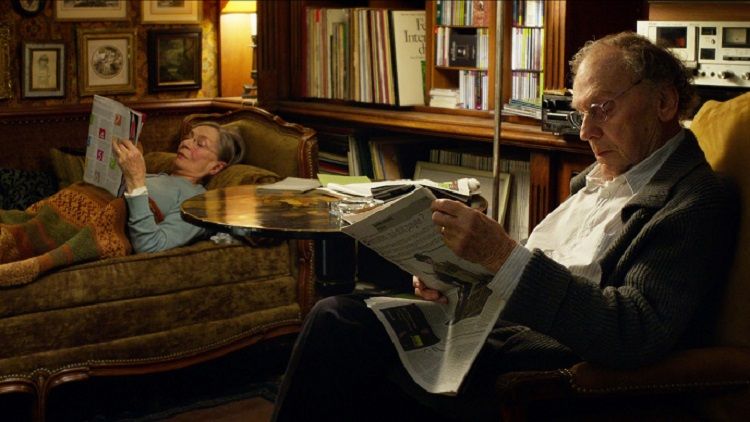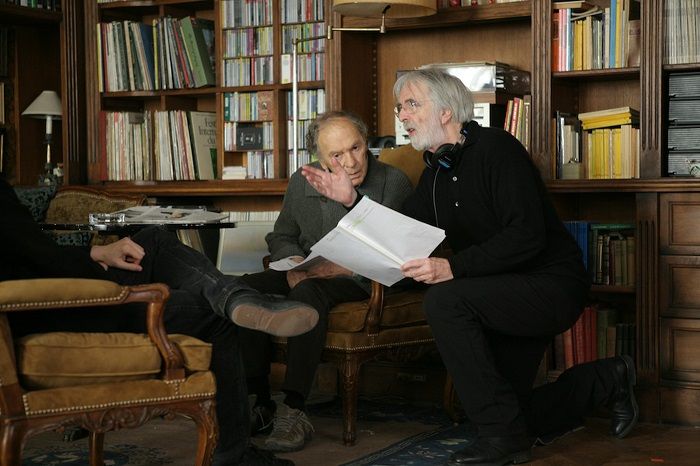The sound of silence in "Amour" by Michael Haneke
The silence in the final inscriptions of the movie "Amour" is embossed. It was striking. When I first watched the Haneke's tape, it seemed to me that there was almost no music in it. In fact, an author's theme does not really sound like that. Then I thought that with such a musical solution, Michael Haneke stresses decisively, with virtuosity - perhaps some new direction that has long been born in the manner of choosing a sound environment in contemporary cinema and is already running without stumbling ... Asceticism and functionality. No affection in the approach to music. The films are supported almost exclusively by the sound ambience . With Haneke, this technique makes music a part of the silence, in its natural continuation, sounding silently.
Music is in the lead role in other bands of this director, whether it implies an impending nightmare (at the beginning of his 1997 "Funny Games" movie and the 2007 remake, where he deftly and without apologizing mounts one after another a duet in Mascani's Aesthetics Opera, the Atalya Opera by Hendel Opera Ballet "Atalanta," in the class performance of Tenor Benjamin Jill, and "Bonehead" by Naked City) or does not use it at all ("Caché " , 2005). The film "Amour", however, is different. He is dressed in music. And director Michael Haneke entangles the sounds in it with the thought, patience and precision of a virtuoso musician and with the finesse of a true Frenchman (he is actually an Austrian born in Munich and grew up near Vienna). It is always somewhat special and exciting for the first generation of sound in every movie - breaking the cozy unity between the viewer and the starting frame. The modest inscriptions on a black background and their soothing, meditative silent movement that begins with "Amour" are terribly broken by the loud kick from the neck. This traumatic break-up of silence at the beginning of the film will legally validate the next directorial decisions with the cameron precision, in which we will witness shock breaks. These sudden changes, proportionately, invisibly and rising, eeriely begin to "echo" Ann's abortive abilities to communicate caused by the stroke she gets. (One of the early titles of the movie is "The music stops.")
In the first frame we see Anne and Georges (in the roles of Emmanuel Riva and Jean-Louis Trentinian), they are among the spectators in the crowded concert hall "Theater de Champs-Elysees". The frame has faded with the audience sitting in the gym. The sound environment is born of all the natural noises inherent to a crowded concert hall (quiet conversations, ruffling dresses, delicate cries). This brings almost documentary credibility and persuasion. There is an eclipse. The camera does not move - still focused on the faces of Anne and Georges, silent in the audience. There are the initial double octaves in Schubert's "Impromptu", op.90, No.1, and we perceive it only through the eyes of the main characters. In this scene the camera does not turn its eye to the piano or the pianist for a moment. (The same approach is also observed in the Pianist, where the music of Schönberg, Rahmaninov and Schubert sounds through the eyes and the atomic excitement of Isabelle Yuper's hands). Schubert's work does not stop to sound and then when they congratulate their pupil. It goes on and on - a night bus with which they return from the concert. And in this very delicate way it turns - as if from functional to author's.
The music was interrupted when changed the frame by unlocking their door in their home and the conversation between Anne and Georges, from which we understand that someone has just tried to rob their house. The integrity of their home at this time is disturbed by ordinary robbers, but it does not seem to create a sense of anxiety for them: nothing essential is stolen, in fact even, perhaps, nothing significant has happened ... It appears somewhat a thin sign that something seems to change in this house. Someone may have opened the door and invited death to their home. Schubert's impromptu, which sounds like a minor, and his rhythmic pulsation resembles a mourning march. The music in the film is performed by the pianist Alexander Tarot, who plays the role of the disciple of Anne and Georges. In some of the comments about his performance in the film, negative criticism may also be encountered. For good or not in performing art, we are rarely looking for some historical credibility. In his cool look at Schubert's music, the cinematic authenticity of the film itself is present, and it is more important to the pulse of the band and the most precise aesthetic direction. The music in the movie sounds rare, but it's invisible all the time. It is a significant part of the dialogue. Of course, this is a must for the world of the movie itself.
The piano teachers, Anne and Georges, are discussing, for example, the "sixteenths in the premise" after Alexander's concert: "... they were wonderful, well ... What a finesse!". The music is also the theme of George's first conversation with their daughter (Isabelle Yuper). And when he tells his wife about the song that some secretary is going to be buried at the funeral - "Yesterday" b"The Beatles" - we understand how this makes him feel special and maybe even creates some inconvenience for his dead friend and the ridiculous musical choice. Later in the film he tried to practice his wife's speaking skills with the French children's song "Sur le Pont d'Avignon / On y danse, on y danse ...". And in a conversation, probably related to their wedding day, in which he tries to raise both her and her spirit, she happily describes how the bells sounded then ... "Ding - dong, ding - dong ..." Sounds of rain over the city " ring "and Ann's suicide attempt. Bells of bells that do not preach a holiday. In one of the most poetic scenes in Tarkovsky's "Solaris" movie, Bach's theme is in the human prelude "Ich ruf zu dir, Herr Jesu Christ", BWV639. Anne in"Amour", listens carefully to the same prelude in Buzoni's processing. The music comes from the next room. With the same weightlessness and harmony as in Tarkovsky, the melody suddenly stops and she shouts: "What's wrong?" In the next frame, we see the abrupt, relaxed Georges sitting in front of the silent, silent forever royal. This scene precedes the scene with the vacuum cleaner, precisely, inhaling the sad traces of life in the spacious room where the royalty is located.
It seems to me that this is one of the brightest sound (noise) and visual metaphors in Amour. In this brief, seemingly weekly scene, the housewife cleans the living room with a vacuum cleaner. The movements, detailed and unobtrusive, seemingly erased as if the last sound of the previous Schubert, sounded up there yesterday. Around the legs of the old King, the sound of a vacuum cleaner was now very busy and simple. In "Amour" we will see only two people playing music in a frame. Once at the fantasy scene of Georges, when he imagines Anne, beautiful and spirited, like a mirage, playing "Impromptu", op. 90, No. 3 by Schubert, and the second time Anne asks his student to play one of Beethoven's Daggers, op. 126, minor salt. Ironically and harshly, Hanekecuts his performance with the next frame in which the former piano teacher Anne learns to manage his wheelchair, which, like a sinister musical instrument, makes sounds and moans from under her hands. The rest of the time is the dumb witness - silenced with Ann, imperceptibly and forever lost his communication capabilities. And with the approaching of the end, with the amplification of the sounds of suffering, the music itself is also washed away. Anne's performance in Georges' imagination is also the latest musical fragment in the film.
The last quarter in the movie "Amour" is soundly resolved, but with love and attention in detail. Short strides, silently sounding sounds, and between them - her intensifying moans, then silence again. And instead of cold, Haneke's naturalistic approach brings humanity and density and excites. In the silence after Anne's death, when Georges ritually, with caution unpacking and cleaning the chrysanthemums-the last flowers he would give her, the silence was suddenly disturbed by the ridiculous and stupid ringing of a phone. Once again, it will remind us: life is gone somewhere outside. Some pigeons fly out. But now nothing can awaken the dead Anne, break his silence and her rest. The apartment from which Anne never goes, along with the paintings, the windows, the silenced instrument - solemnly dashed in the center of the bright living room - is the other actress in the film "Amour" along with the duet - Emmanuel Riva / Jean-Louis Trentinian and the music Schubert, Bach and Beethoven. Among this company, Michael Haneke hit our hearts with kicks.



I like your post ..
Thank you :)
a very perfect music post, I like your article
Thanks :)
You are welcome
you analyze the movie from an amazing perspective. really helpful. i think i must watch it again.
I warn you that the movie is very distressing :)
actually i kind of like distressing movies like this :D
Beautiful Sound 😊
Greeting
I warn you that the movie is very distressing :)
:)
Would i really love to watch this movie?
Maybe... I dont know what movies you prefer
This is my favorite Haneke movie (thank you @godflesh for reminding it!) and It is ja love story at heart, so i definitely recommend it... but you may find it too early to confront the reality of old age.
Yes, very true :)
Insightful analysis. Arousing my curiosity to go see the movie
I am glad to hear that :)